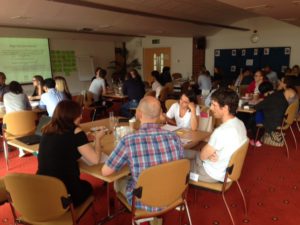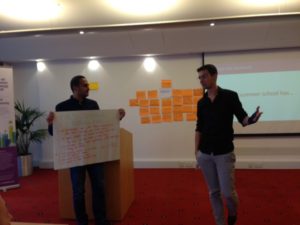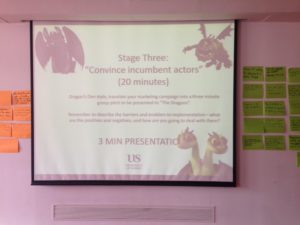Thoughts and reflections on CIED Summer School 2017
By Bettina Zenz
The CIED Summer School on ‘Accelerating Innovation to Reduce Energy Demand’ took place from 10-12th of July 2017 at the University of Sussex, Brighton. CIED’s first ever Summer School was certainly much anticipated by organisers and attendees alike, and brought together 28 doctoral, postdoc and early career researchers from multidisciplinary backgrounds who took part in a unique opportunity to hear from leading thinkers in the fields of innovation and energy demand.
As one of the few non-academic participants, I was slightly worried that the discussions would be way over my head, but it turned out very soon that this had been an unnecessary worry. With the participants coming from such varied backgrounds, the presentations and talks all managed to introduce different and often somewhat complex aspects of their respective fields in a clear and simple manner, which led to much audience participation and many stimulating questions. Below are the three highlights I took away from the Summer School:
1) It was interactive!
With many of CIED’s most established and internationally recognised researchers giving presentations about their work, there was a lot of ground to cover in a short period of time. Prof Frank Geels, Dr Karoline Rogge, Prof Johan Schot and Dr Paula Kivimaa each ran sessions that introduced socio-technical approaches, policy mixes for fast-tracking low carbon innovation, and theoretical models of diffusion. All three academics offered highly valuable insights into their empirical and theoretical research, and also invited questions from the participants throughout their presentations.
 This offer was taken up with much enthusiasm and led to stimulating debates. It was great to see so many students using this opportunity to find out more about the projects, theories and lessons learnt, and ask many interesting questions linking the research scope to policy decisions, the ‘real world’, and other findings in social science. Another observation was that all four academics were excellent at making complex theories accessible and took time explaining them in more detail, which was helpful when it came to more complicated notions such as regimes, niches, and intermediaries.
This offer was taken up with much enthusiasm and led to stimulating debates. It was great to see so many students using this opportunity to find out more about the projects, theories and lessons learnt, and ask many interesting questions linking the research scope to policy decisions, the ‘real world’, and other findings in social science. Another observation was that all four academics were excellent at making complex theories accessible and took time explaining them in more detail, which was helpful when it came to more complicated notions such as regimes, niches, and intermediaries.
All academics made a point of inviting any further queries about their work outside and beyond their presentation slots at the conference, which led to many energy themed chats over coffee and lunch on the sunny balcony. It was also great to see how much networking and communication took place during break times and in the social programme in the evenings, which showed just how much interest our future researchers have in the broad disciplines covered by innovation and energy efficiency.
2) It was fun!
To make sure that our summer school attendees also had a chance to design and promote ideas of their own, the programme offered valuable sessions for team work. Dr Kirsten Jenkins ran a ‘Dragons’ Den’ style session that was designed to encourage the participants to think through the application of socio-technical concepts in practice, yet with an innovative and unusual twist.
To get the groups thinking about how to apply socio-technical transitions theory, they were asked to introduce a niche product to the market, starting from the very beginning at the emergence stage, all the way through to its diffusion, whilst dealing with potential barriers and enablers that might feature during this process.
To add to the challenge, the groups then had to pitch their new product as part of a marketing campaign to a very established panel of actors – the dragons (aka Jenny Bird, Dr Tim Schwanen, and Dr Mari Martiskainen) and convince them to invest into their product. The outcomes of this task were all remarkable and innovative, ranging from new transport models including suggestions for driverless cars and car sharing initiatives, wind energy, and even a community hub providing shared energy generation and appliances.
Participants also had an opportunity to present their own research to the group in a session run by Dr Debbie Hopkins. Florian Knobloch was awarded the prize for the best presentation, with acknowledgement from the judges for his creative use of The Simpsons as a communication tool.
3) It was inspiring!
One of the most enjoyable and motivational sessions for me was the session on ‘how to achieve academic impact’ by Prof Benjamin Sovacool. The media likes to remind us about the many challenges faced by aspiring academics once they enter ‘the real world’, including worries about fixed term contracts, international competition over rare post-doc contracts, and an uneven work-life balance. Whilst there is of course some truth in all of these concerns, such reports also paint a dark picture of the career prospects of researchers.
Prof. Sovacool’s talk provided a refreshingly honest and inspiring insight into how current and future academics can be proactive about promoting their research. This included information on how to engage with different publishers, journals, online databases and the media, as well as advice on how to make connections and network in the academic world. Benjamin also gave plenty of useful tips on how to engage in a meaningful way with other academics, collaborate with established authors, write articles and blogs, and partner with researchers for grant proposals

Concluding thoughts
In summary, I can most definitely say that I have learned a lot over the last three days. It was an absolute pleasure to meet such a diversified group of inspiring people working on so many interesting topics, and witnessing new connections and networks being made. From the organisational end, we have certainly enjoyed this learning process, and would like to thank everyone who has attended for their enthusiastic participation.
***************************************************************************************************************
To read more about CIED’s Summer School 2017, including presentations and photos from the event, please click here.
